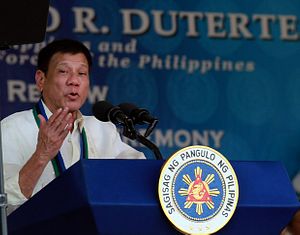The Hague arbitral tribunal has released its highly anticipated decision on the Philippines v. China case. Largely favorable to the Philippines, the court essentially invalidated China’s expansive claim in the South China Sea (SCS): “there was no legal basis for China to claim historic rights to resources within the sea areas falling within the ‘nine-dash line.’”
However, despite this legal victory, the fact remains that the decision is unenforceable. A tragic reminder of the international system’s anarchical nature, the ruling, by itself, is largely a symbolic triumph for international law—the implementation of which is still incumbent upon the nation-states. An added complication to the matter is that the SCS is an operational theater of the Asia-Pacific regional power shifts. Indeed, as the pendulum of global power swings from the West to the East, the established rules, principles, and norms of the U.S.-led international system will be put to a serious test by rising powers, foremost of which is China.
Against this backdrop, Manila, now armed with a favorable decision, must carefully balance its relations with China and its allies and partners. Notwithstanding the legal challenge posed by Manila, Beijing has sent an unmistakable signal of its determination to pursue expansion through its reclamation activities in the SCS, as well as the modernization of its military. By conducting military exercises in the disputed waters shortly before decision was issued, China sent a message that its behavior in the SCS will most likely remain the same. Evidently, strongly worded pronouncements by Manila that call for Beijing’s compliance further risk the escalation of tensions. Faced by a diplomatic setback and strong internal pressure, China may initiate a military response to assert its claims in the SCS.
Clearly, what the Philippines can hope for, at best, is to have a modus vivendi with China. Thus far, it appears that the new Philippine government is pursuing this approach. Adopting a more conciliatory stance, Philippine President Rodrigo Duterte earlier announced that Manila will neither “taunt [n]or flaunt” a favorable verdict. Even before taking office, Duterte said that he is open to joint exploration and development initiatives in the SCS. During the campaign, then-candidate Duterte said that if China will provide infrastructure projects during his presidency, “I’ll shut up” about maritime disputes.
With the favorable decision, Philippine Foreign Secretary Perfecto Yasay called for “restraint and sobriety.” As Manila tones down its nationalist rhetoric under the new government, there is a window of opportunity for Sino-Philippine relations to improve, even in the face of the court’s ruling. In the short- to medium-term, the Philippines and China may compromise on the issue of fishing, as well as the possible exploitation of resources. Indeed, shortly before Duterte’s inauguration, China sent such overtures to the Philippines by easing harassment on Filipino fishermen. In the long-term, the challenge for Manila and Beijing is to develop conflict management mechanisms that would contribute to a stable Sino-Philippine relationship. It is therefore an opportune time for the Philippines and China to resume high-level dialogue as well as the establishment of a hotline that may diffuse tensions in time of crisis in the disputed waters. Existing mechanisms, like the Defense Security Talks (DST), may be used as platforms to plan and strengthen such bilateral initiatives. Absent a strong military and economic leverage, the Philippines’ only bargaining tool—the court’s decision—must not be used to further diplomatically embarrass China. Strong rhetoric, such as the comparison of China to Nazi Germany, which Duterte’s predecessor did on two occasions, may derail this chance to repair ties.
However, improved ties between Manila and Beijing must not come at the expense of the former’s relationship with its allies and partners. To his credit, former Philippine President Benigno Aquino III engineered closer relations with the United States. By forging the Enhanced Defense Cooperation Agreement (EDCA) with Washington, Manila created a platform by which it can facilitate the Obama administration’s rebalance policy in the Asia Pacific. The Aquino administration also established strategic partnerships with two key regional players: Japan and Vietnam. Aside from enhancing its external defense capabilities, Manila must enhance its security relations with these countries through dialogue, joint exercises, transfer of technology and equipment, among others. Also, the favorable decision from The Hague will give added legitimacy to U.S. Freedom of Navigation Operations (FONOPs) in the SCS. To avoid antagonizing China but to continue supporting Washington, Manila may express subtle support but not openly oppose FONOPs.
The United States, Japan, and Vietnam understand that, without formal enforcement mechanisms, a diplomatic ballet would ensue after the verdict’s release. As their own policies suggest, these countries recognize the strategic importance of engaging China but at the same time pursuing security initiatives to counter Beijing’s assertiveness. Hence, in this context, Manila must also strike a similar careful balance act between these two strategic objectives.
Mico A. Galang is a researcher at the National Defense College of the Philippines (NDCP). The views expressed are the author’s alone and do not necessarily reflect the official position of NDCP.

































